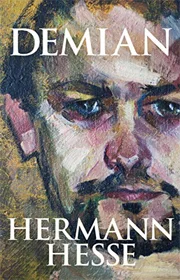
Demian by Hermann Hesse is a captivating bildungsroman that follows the turbulent coming-of-age journey of Emil Sinclair in late 19th and early 20th-century Germany. Emil grapples with societal expectations and his inner conflicts until he befriends the mysterious Demian, whose influence exposes him to profound philosophical and spiritual ideas. This friendship becomes the catalyst for Emil’s internal transformation, leading him to confront the complexities of good and evil, and ultimately seeking a unique identity beyond societal norms. Hesse’s lyrical prose weaves together existential themes, making Demian a timeless exploration of self-discovery and the intricate facets of human nature.
Read Demian Flipbook:
Listen to Demian Audiobook:
Title: Demian
Author: Hermann Hesse
Genre: Bildungsroman (coming-of-age novel)
Published: 1919
Setting: Germany during the late 19th and early 20th centuries
Plot Summary: Demian follows the protagonist, Emil Sinclair, as he navigates the complexities of his youth, exploring themes of self-discovery, spirituality, and the struggle between good and evil. The story revolves around Emil’s friendship with the enigmatic Demian, who guides him on a journey of inner transformation and challenges societal norms.
Themes: Existentialism, individuation, the duality of human nature, the search for identity, and the clash between conventional morality and personal freedom.
Style: Hermann Hesse’s lyrical and introspective writing style, often blending psychological and philosophical elements.
Influence: Demian is considered a seminal work in the development of Hesse’s ideas on spiritual growth and self-realization, themes that resonate with readers seeking deeper insights into human nature.
Legacy: The novel has left a lasting impact on literature and has been widely studied for its exploration of psychological and philosophical concepts. It remains a classic in the Bildungsroman genre.
Pen Name: Hermann Hesse wrote Demian under the pseudonym Emil Sinclair, the same name as the novel’s protagonist.
Influence of World War I: The novel was written during World War I, and its themes of inner conflict and transformation can be seen as reflections of the turbulent times.
Spiritual Exploration: Hesse’s interest in Eastern philosophy and spirituality is evident in Demian, as the novel delves into themes of self-realization and enlightenment.
Artistic Connections: The book’s cover features an illustration by Hesse’s friend, Swiss painter Simeon Solomon, adding a personal artistic touch to the edition.
Interpretation of Symbols: The novel is rich in symbolism, with recurring themes such as the bird, representing freedom, and the mark of Cain, symbolizing individuality and rebellion.
Philosophical Influences: Hesse was influenced by the ideas of Swiss psychologist Carl Jung, and this is reflected in the novel’s exploration of Jungian concepts like individuation.
International Acclaim: Demian gained popularity internationally after its English translation, earning Hesse recognition beyond German-speaking audiences.
Impact on Counterculture: In the 1960s, the book became a countercultural icon, resonating with the rebellious spirit of the time and inspiring the youth movement.
Musical Inspiration: The rock band Genesis drew inspiration from Demian for their concept album “Nursery Cryme,” especially the song “The Fountain of Salmacis.”
Literary Awards: While Demian itself did not receive major literary awards, Hesse later won the Nobel Prize in Literature in 1946, partially due to the influence of his collective works, including this novel.